Get in touch
hello@stymix.com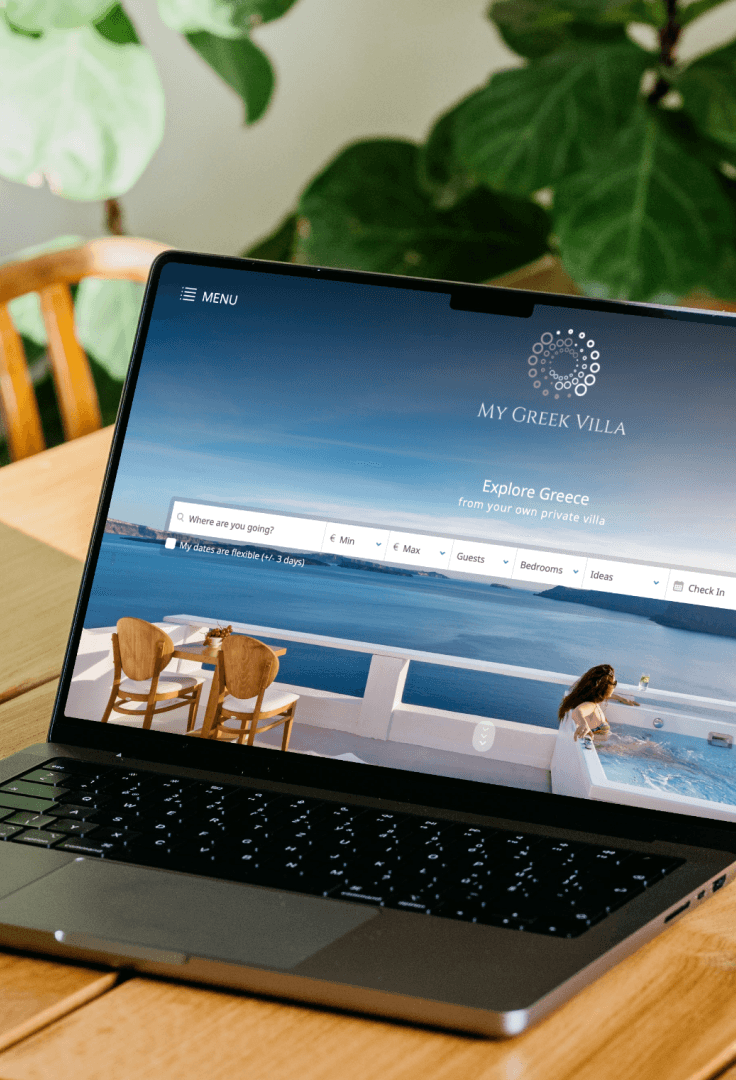
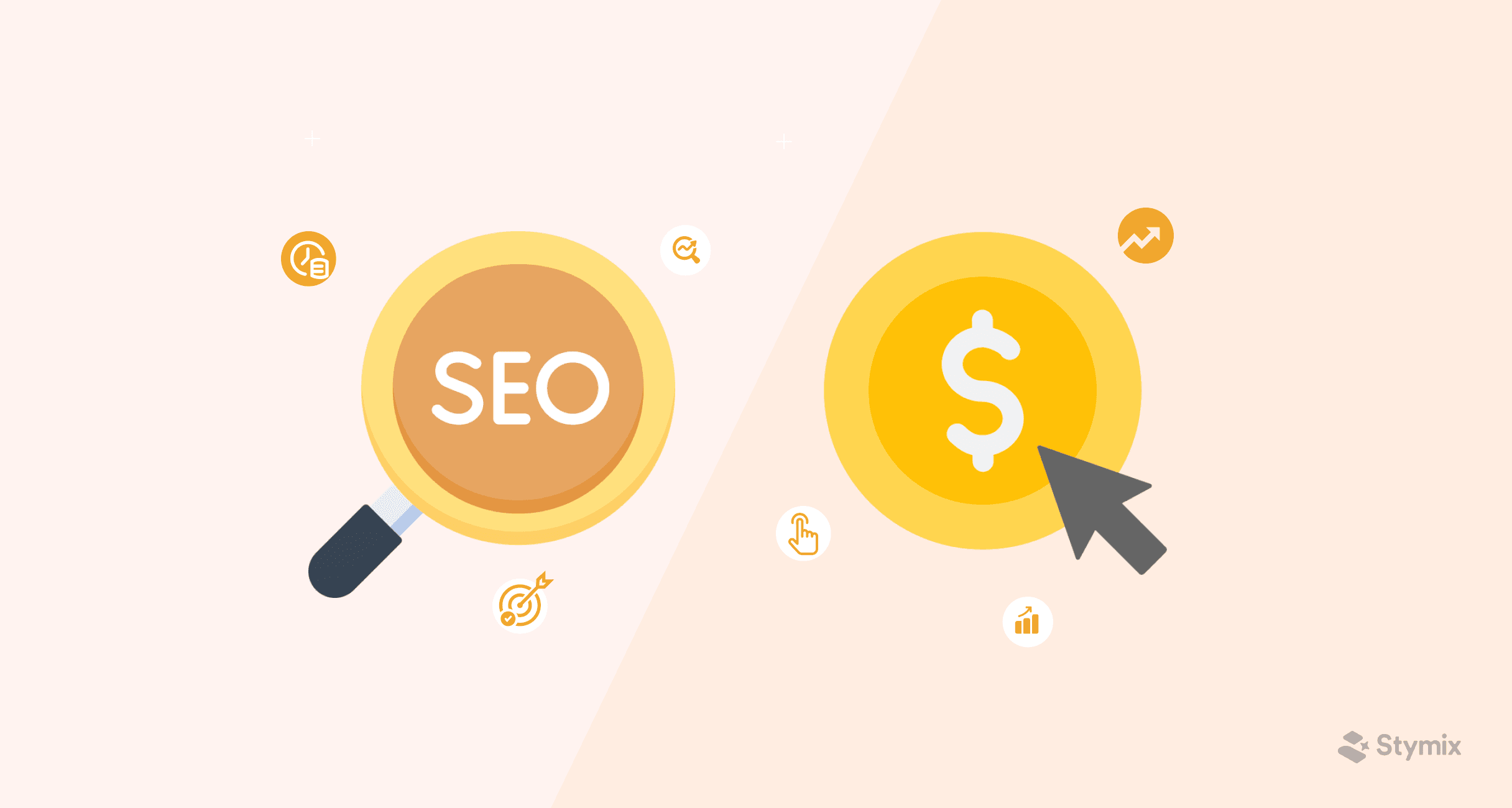
SEO and PPC are two major strategies that stand out for businesses aiming to enhance their online presence. The debate between SEO vs PPC has been going on forever. While both have their strengths and weaknesses, understanding them is crucial to making an effective online marketing strategy.
Search engine optimization, or we know it in short as SEO, is the cornerstone of organic traffic building. It involves optimizing websites to get a higher rank in search engine results.
The primary principle of SEO is to increase visibility and attract relevant traffic from organic searches.
This search engine marketing approach could be used in images, videos, listings, related searches, People Also Ask box, etc. An example of organic search results is given below:
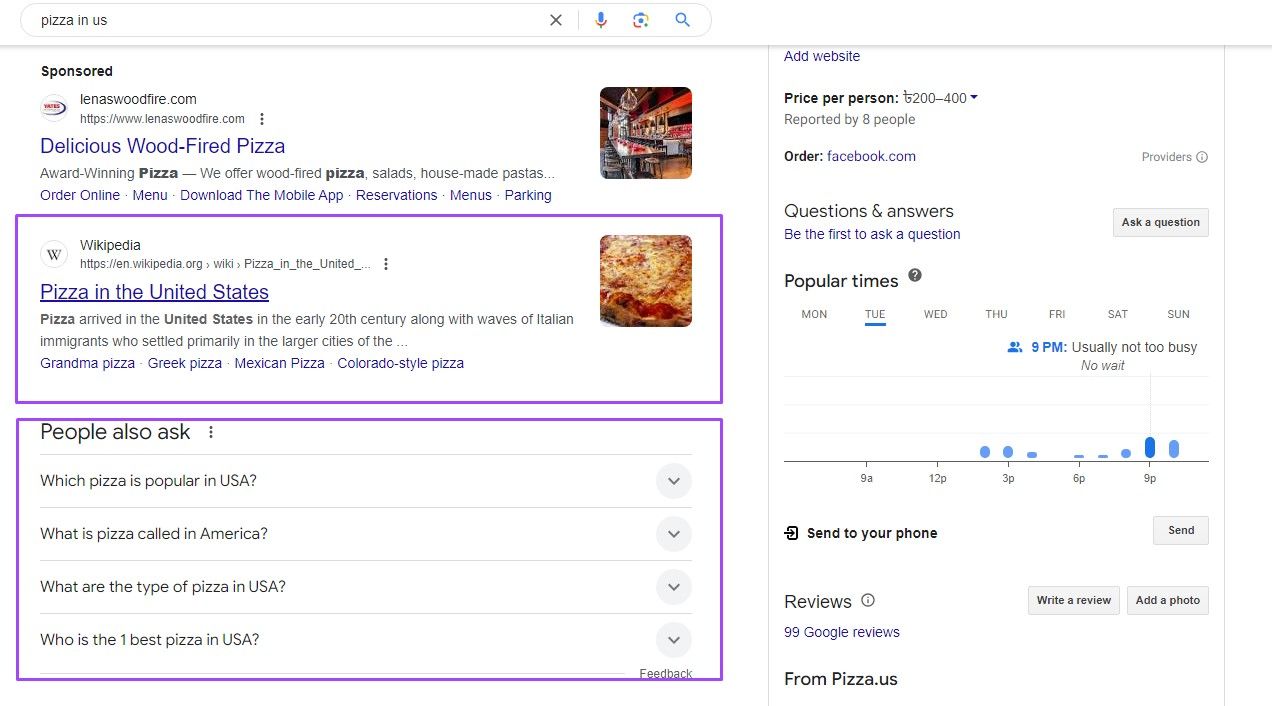
Without spending money on advertisements, SEO makes your website show up in search results. It's like planting seeds in a garden – with time and care, your website can grow and stay visible for a long time.
While SEO may take some time and effort upfront, it's like investing in a sturdy tree that continues to bear fruit.
Once your website ranks well, you won't need to spend as much on advertising, saving you money in the long run.
Websites that show up at the top of search results are like trusted friends. When your website ranks well, people trust it more, making it easier to attract customers and build a loyal following.
SEO is like tending to a garden – it requires regular care and attention. It may take a while to see results, and you'll need to be patient and persistent.
The ranking of your website may be impacted by the constant changes made by search engines like Google. So, you need to keep adapting to stay ahead.
Once your website ranks well, you can't just sit back and relax. Like a garden, it needs ongoing care and maintenance to keep it healthy and thriving.
You'll need to keep updating your content, building links, and staying on top of new SEO trends to maintain your ranking.
PPC, or Pay-Per-Click, is a type of advertising online where you get traffic from paid search. Each time a user clicks on your advertisement, you have to pay for each click.
In PPC advertising, you create ads and bid on keywords related to your business. And when people search for those keywords, your ad may show up at the top of the search results.
The elements of PPC marketing include images, site links, star ratings, Business Profile location, etc.
Usually, PPC advertising is done by
Below is an example of paid search ad results.
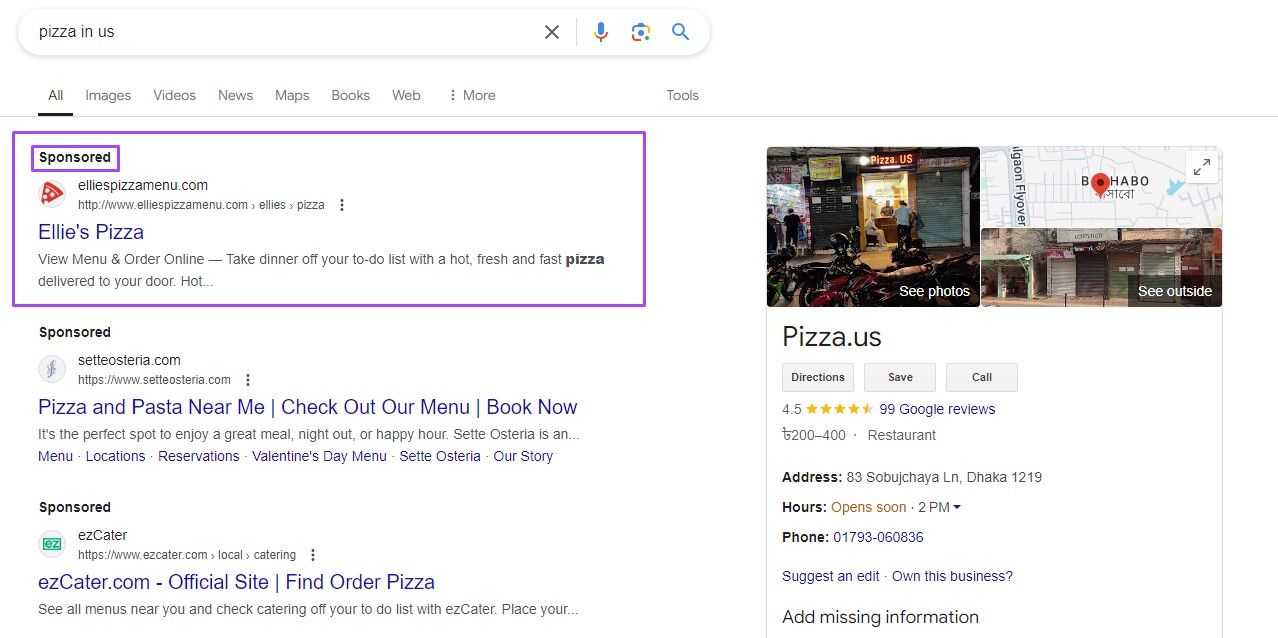
Here are some major advantages of PPC advertising that can help you decide whether you should invest in paid search or not.
With PPC, your ads can show up right away when people search for relevant keywords. Plus, you have control over who sees your ads based on location, interests, and devices. So if you are looking for immediate increase in traffic and conversion, PPC is the way to go
PPC platforms provide detailed analytics, allowing you to track your ads' performance. This helps you calculate your ROI and to choose an effective advertising strategy.
You can set your budget for PPC campaigns and adjust it anytime. This flexibility allows you to allocate more budget to well-performing campaigns and tweak your strategy as needed.
There are also downsides to PPC marketing. Some are:
Popular keywords can be expensive to bid on, making PPC advertising costly, especially for small businesses with limited budget.
Success in PPC advertising relies heavily on understanding ad platforms and bidding strategies. Without proper knowledge, you may not get the desired results from your campaigns and lose valuable investment.
PPC campaigns are vulnerable to click fraud, where competitors or bots click on ads to deplete budgets and sabotage campaigns. This can result in wasted spend and reduced ROI if not monitored closely.
Before you get confused about which one is better, SEO or PPC, here is a brief comparative analysis:

To optimize your website, SEO often requires an initial investment of time and resources. However, once established, SEO can provide long-term value by generating organic traffic without ongoing costs per click.
PPC campaigns, on the other hand, provide instant visibility but necessitate ongoing funding to keep ad placements. It doesn't reap the benefits once the spending on it ceases.
Calculating ROI (Return on Investment) is an important element in determining both strategies' cost-effectiveness.
For SEO, you look at the money you make from people who find your website through search engines. Then, you subtract the costs of doing SEO, like creating content or hiring someone to help. The difference shows if your SEO efforts are making you money or not.
For PPC, you check how much money you make from people clicking on your paid ads. Then, you subtract the costs of running those ads, like the money you spend on ads and managing them.
You can compare and choose the higher ROI strategy. But whenever you're doing this, remember some more traffic may come from your SEO strategy again.

SEO typically takes time to see significant results. Because it involves improving website rankings organically through content creation and optimization.
In contrast, a PPC campaign can generate immediate results, but it requires ongoing management and optimization to maintain effectiveness.
SEO also demands continuous effort in terms of content updates, backlink building, and technical maintenance, while PPC campaigns need regular monitoring and adjustments to maximize ROI.

SEO focuses on organic visibility. This approach targets users actively searching for related keywords but may take time to achieve high rankings.
In contrast, PPC offers paid visibility, allowing businesses to target specific demographics, locations, and interests instantly. PPC provides precise targeting options and broad audience reach, making it ideal for short-term campaigns.
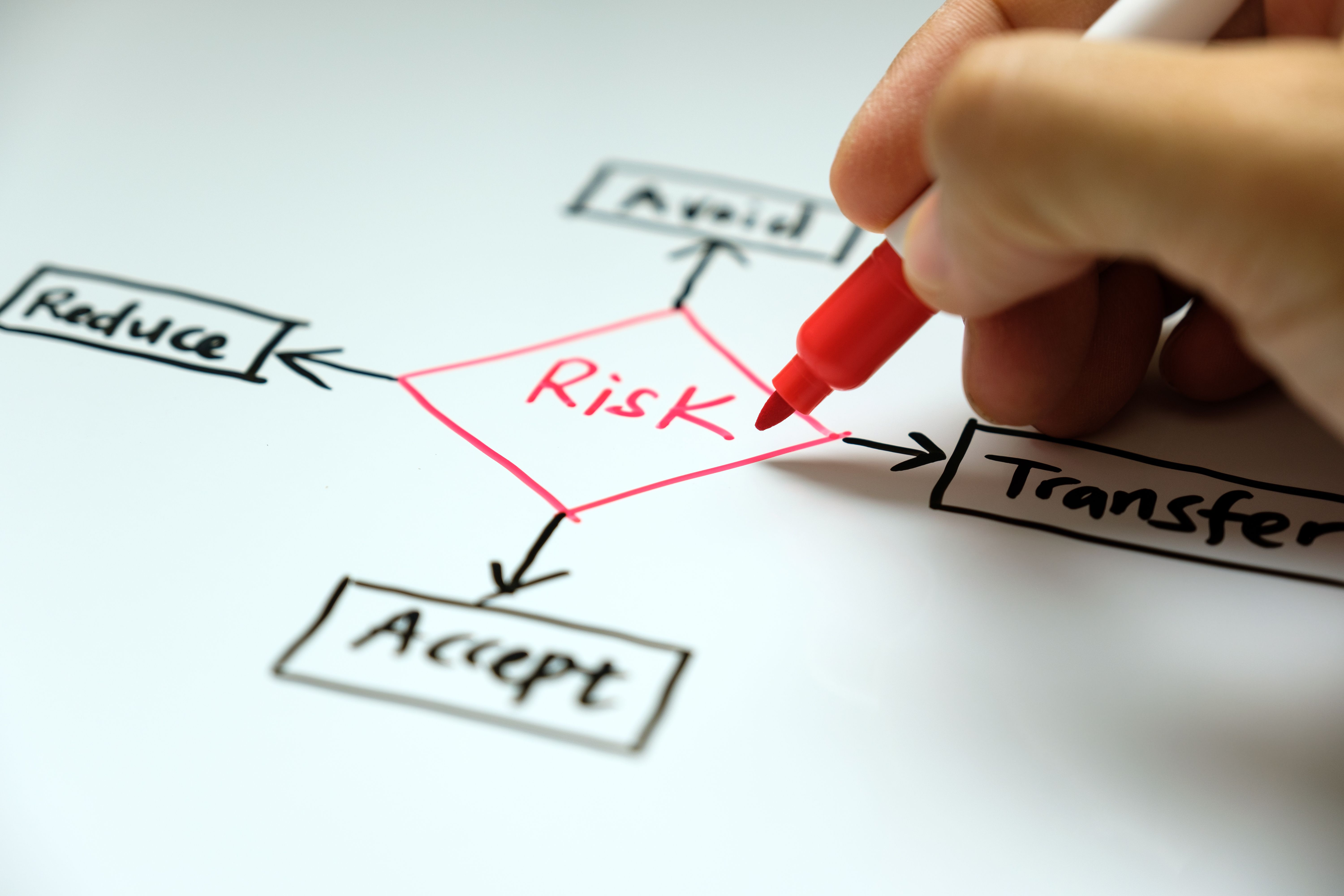
SEO's reliability depends on search engine algorithms, which can change unexpectedly and affect website rankings. While SEO provides long-term benefits, it's susceptible to algorithm updates and industry changes.
In contrast, PPC offers more control over visibility but relies on the reliability of paid advertising platforms. Click fraud and ad platform changes pose risks to PPC campaigns.
So it's judgement time, SEO or PPC? Well the answer is not a straight one.
Whether you should use SEO or PPC, depends on your situation and what you need. We really can't debate which one is better without context as both of the strategies aim to increase traffic.
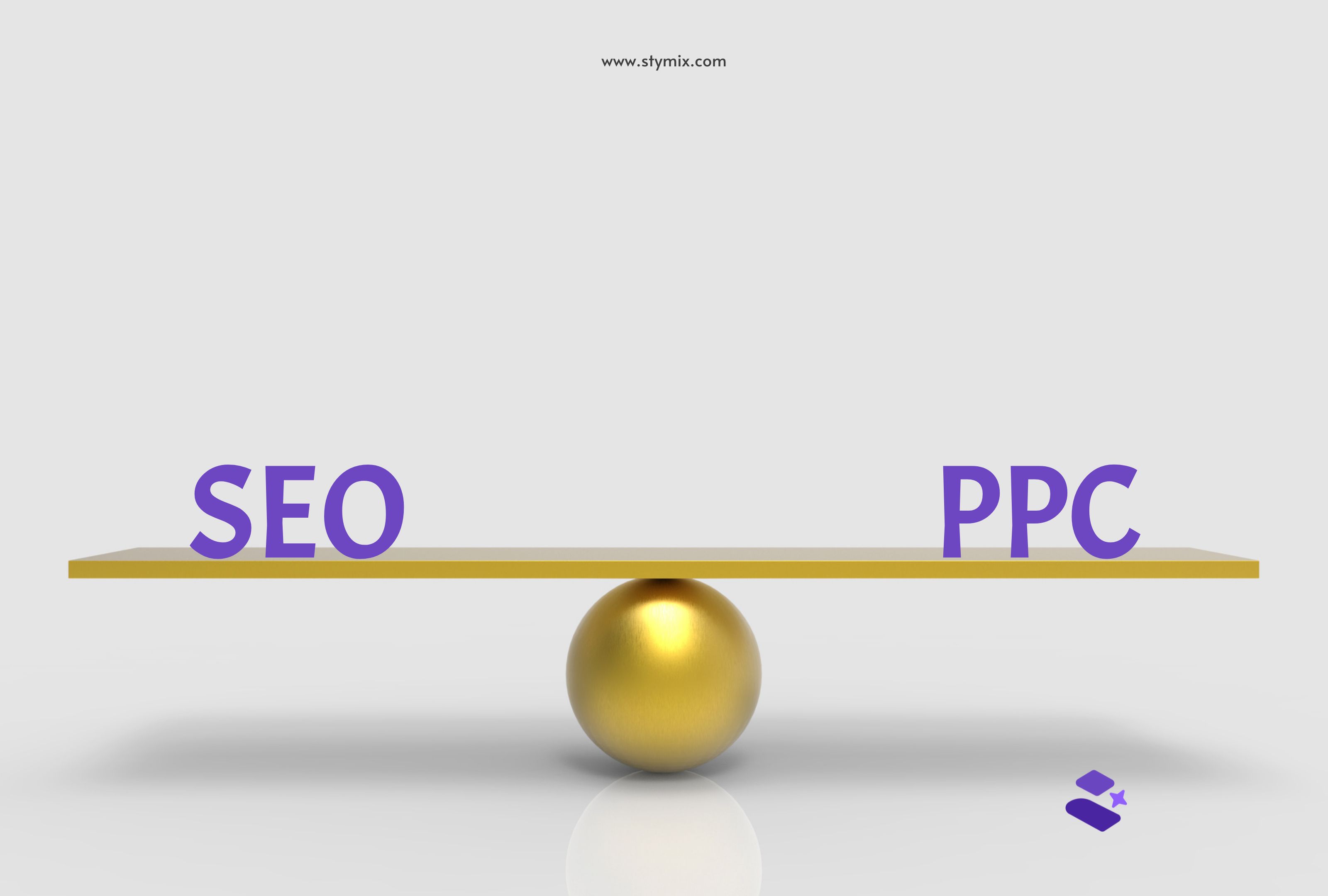
Let's assume some of the situations below where you can decide which one to choose.
Niche products cater to a specific market segment with unique features. These products may have a smaller target audience compared to mainstream products.
Since niche products target a specific audience, getting organic traffic might take a longer time.
In such cases, picking PPC marketing can help you build fast brand awareness and increase much-needed traffic.
If you have a limited budget and are looking for cost-effective solutions, SEO could be the way to go.
While SEO requires an initial investment in time and resources, it provides sustainable results without continuous financial investment.
Product launches or sales events, require immediate visibility and targeted promotion to attract customers.
So, for a product launch or one-time offer, PPC is the better option as it provides immediate results and targeted traffic.
Highly competitive products or commercial content, face intense competition in the market. So, it might be challenging to gain visibility and attract customers through organic means alone.
PPC is more effective for promoting highly competitive products or commercial content, especially when immediate visibility is crucial. But it will be best if you invest in both strategies in this case for a more sustainable growth.
There's no one-size-fits-all answer when choosing between SEO and PPC marketing. Both can be beneficial if you use them right. Whether it's a PPC campaign or advanced search engine optimization, the choice depends on your specific goals, budget, and target audience.